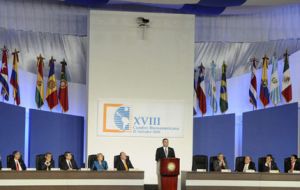MercoPress. South Atlantic News Agency
Absences and late arrivers mark summit in El Salvador
 Pte. Antonio Saca opening the Ibeo-American Summit
Pte. Antonio Saca opening the Ibeo-American Summit The current global economic and financial crisis overshadowed the official agenda of the 18th Ibero American two-day summit in El Salvador which ends on Friday.
According to official documents, the summit's agenda includes such topics as decent employment, education, values, health, and wholesome leisure and recreation for young people. Addressing a watered down summit since not all leaders turned up, Salvadoran President Antonio Saca said that young people in the countries of Ibero-America will not settle for declarations of "good intentions," and expect to see "tangible results" that will address their demands and provide them with opportunities to achieve their goals. "I believe in the creative potential of our young people," but "it is of vital importance to promote programmes aimed at keeping them away from drugs, organised crime and violence and vices," Saca declared. The summit normally convenes leaders from 19 Latinamerican countries and from Spain, Portugal and Andorra, but this time several outstanding personalities did not turn up: Venezuelan President Hugo Chávez; Uruguay's Tabaré Vásquez; Cuba's Raúl Castro and Portuguese President Anibal Cavaco Silva. The reason given by Chávez, who claimed an attempt against his life was being planned, upset both host authorities and participants as well as conservative Salvador media, who say the excuse was not very "convincing." Other heads of state chose to arrive late and miss part of the meeting. That was the case of Honduran President Manuel Zelaya, who slipped in towards the end of the opening ceremony, while Bolivia's Evo Morales, Argentina's Cristina Fernández, and Brazil's Lula da Silva arrived even later. The Brazilian leader was scheduled to leave for Cuba following the official group's picture. At the opening ceremony, Ibero-American Secretary General Enrique Iglesias said that while young people today are "better prepared and most highly networked than at any other time in the history of the region," such gains are only available to a "minority" of youths. Alongside these fortunate young people live others who are "mired in poverty, ignorance, family break-up and the destitute conditions of slums…and they are the majority." Less than 50% of the 110 million young people living in the region work, and only 17% of these have formal sector jobs, said Iglesias. Chilean President Michelle Bachelet proposed that the economic crisis be directly discussed by heads of state in a closed-door meeting. The UN Economic Commission for Latin America and the Caribbean (ECLAC) this week warned that the region would suffer the crisis through a drop in investments, remittances and demand for its raw material exports. Spanish Prime Minister Jose Luis Rodriguez Zapatero and Ibero-American Secretary General Enrique Iglesias have raised the possibility of an IMF return to Latin American countries which have turned their backs on the multilateral lender in recent years. "The financial markets are practically closed to emerging markets and sooner rather than later businesses and governments will have to study that alternative," said Ricardo Hausman, economics professor at Harvard University. Argentine president Cristina Fernandez de Kirchner lashed against capitalism and free markets, and argued strongly in favour of government intervention in the economy and markets. "The indestructible system has suffered the chronicle of an announced death, it was inevitable". Mrs. Kirchner said that in a few days she would be travelling to the "heart of the storm, to the US for the G 20 financial round talks" and would insist "the US must assume the crisis and failure", which will have a tremendous impact on the most vulnerable. More over, "what we are witnessing is the failure of the indestructible model". She then underscored that governments must intervene in the economy and in markets, "not for ideological reasons, but empiric reasons".




Top Comments
Disclaimer & comment rulesCommenting for this story is now closed.
If you have a Facebook account, become a fan and comment on our Facebook Page!